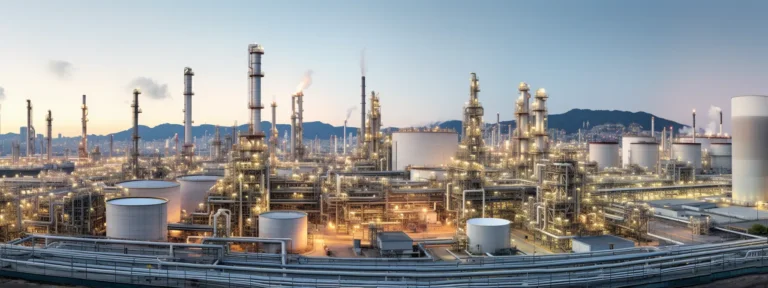The ever-shifting landscape of the international petroleum industry beckons constant attention with markets responding to geopolitical maneuvers, innovative extraction technologies, and fluctuating demand. As global economies wrestle with energy requirements, the ebb and flow of oil production and consumption paint a dynamic tableau of the industry’s health. Stakeholders and observers alike navigate a labyrinth of trade policies, seeking pockets of investment potential while gauging the pulse of environmental impacts. Unveiling the intricacies of the petroleum sector, from its current state to future projections, invites a rich understanding of its global dynamics. Keep reading to unravel the complexities of the Global Dynamics of the International Petroleum Industry and how they shape the energy narrative of tomorrow.
Navigating the Global Dynamics of the Oil Industry
- The International Petroleum Industry Is Shaped by Diverse Elements, Including Geopolitics, Oil Supply and Demand, OPEC’s Influence, Emerging Economies, and Technological Innovations
- Geopolitical Tensions Among Nations With Vast Crude Reserves Can Lead to Fluctuations in Oil Prices and Impact Global Oil Supply
- The Balance Between Oil Supply and Demand Is Crucial in Determining the Stability of the Industry, With Exploration Projects, Energy Policies, and Consumer Behavior Influencing the Demand Side
- OPEC Plays a Significant Role in Regulating Oil Availability and Market Dynamics, Making Strategic Output Adjustments to Align With Member Countries’ Fiscal Objectives
- Emerging Economies, Such as India and China, Contribute to Increasing Global Oil Demand as Their Industrial Bases Expand, While Technological Innovations Revolutionize Production Methods and Enhance the Industry’s Resilience
Exploring the Current State of Oil Markets Worldwide within the Global Dynamics of the International Petroleum Industry

As the international petroleum industry continues to grapple with a myriad of factors influencing its trajectory, the examination of oil markets reveals a complex landscape shaped by diverse elements.
The variegated nature of geopolitics plays a pivotal role, frequently triggering fluctuations in oil prices that resonate across continents.
Concurrently, the meticulous analysis of oil supply vis-à-vis demand offers critical insights into the sector’s stability and future prospects.
Within this intricate web, OPEC emerges as a formidable entity wielding significant influence over market dynamics, while the ascent of emerging economies introduces fresh challenges and opportunities in the field of international petroleum exploration and exploitation agreements. The international petroleum exchange plays a key role in facilitating these agreements.
Additionally, technological innovations stand at the vanguard of revolutionizing production methodologies, setting the stage for profound shifts within the industry.
Assessing the Impact of Geopolitics on Oil Prices
The landscape of global energy markets often finds itself at the mercy of geopolitical currents. Elevated tensions among nations, especially those with vast reserves of crude, can lead to heightened uncertainty, sending shockwaves through pricing indices critical to oil’s fiscal performance.
Owing to intricate alliances and rivalries, decisions emanating from oil-rich regions not only dictate the tempo of production but also the accessibility of crude in international waters under international petroleum exploration and exploitation agreements, sculpting a precarious balance between abundance and scarcity that continuously molds the cost of this indispensable commodity.
Analyzing the Balance of Oil Supply and Demand
The interplay between oil supply and demand serves as a barometer for the industry’s vigor, with each ebb and flow signaling subtle shifts in economic tides:
- Ongoing exploration projects and current drilling activities inject a steady stream of supply, yet these efforts are consistently measured against global consumption rates.
- Energy policies and consumer behavior patterns equally contribute to the demand side, often influenced by environmental concerns and technological advancements in alternative energy sources.
- Periodic reports from major energy agencies crystallize data trends, providing stakeholders with essential metrics critical for forecasting and strategic planning.
Sectors like transportation and manufacturing, voracious consumers of oil, serve as direct indicators of the demand curve, requiring continuous observation to anticipate possible market realignments in the energy products.
Evaluating the Role of OPEC in Market Dynamics
OPEC’s influence on the international petroleum industry cannot be underestimated, often likened to a conductor orchestrating the complex symphony of global oil supply. This consortium, comprising some of the most oil-rich nations, has the ability to make decisive output adjustments that reverberate through the markets, subtly coercing prices to align with its member countries’ fiscal objectives.
By setting production targets, OPEC effectively regulates the availability of oil on the international stage, a tactful exercise of power that either alleviates or exacerbates the market’s volatility. Their strategic maneuvers in response to global economic conditions underscore the organization’s pivotal position in stabilizing or stirring the petroleum sector.
Understanding the Influence of Emerging Economies
Emerging economies exert a transformative impact on the energy sector, notably in the way their expanding industrial bases amplify oil consumption. As these nations navigate their pathways to industrialization, their burgeoning energy needs have become a prominent driver of global oil demand.
| Country | GDP Growth Rate | Industrialization Level | Increased Oil Demand (Barrels/Day) |
|---|---|---|---|
| India | 7.5% | Intermediate | 500,000 |
| China | 6% | Advanced | 1,200,000 |
| Brazil | 1.1% | Developing | 300,000 |
The rise of these economies not only alters the landscape of consumption but also ushers in new players within the sphere of oil production. Nations once mute spectators in the narrative of oil are repositioning themselves as influential protagonists with the capability to affect market balances themselves. The Middle East is a key region for fuel oil and petrochemicals.
Studying the Effect of Technological Advances on Production
Technological innovations are unequivocally altering the landscape of oil production, rendering extraction and processing more efficient and cost-effective. Breakthroughs such as hydraulic fracturing and horizontal drilling have unlocked previously inaccessible reserves, markedly transforming the United States into a leading producer of energy products. The oil company is at the forefront of this energy transition.
Simultaneously, advancements in digital technology, including data analytics and automation, are optimizing operational performance and reducing downtime in oil fields. This harnessing of cutting-edge technology streamlines production processes, enhancing the industry’s resilience against volatile market conditions. The oil company’s project manager plays a crucial role in ensuring successful implementation.
Trends in International Petroleum Production and Consumption

The dynamic realm of the international petroleum industry continually adapts to evolving circumstances, illustrated by changing production hierarchies and consumption habits.
As some nations ascend the ranks to become formidable producers of oil, the sector keeps a watchful eye on the rising tide of renewable energy sources and their implications for traditional oil demand and energy products.
Shifts in global consumption patterns reverberate through the energy community, signaling alterations in economic development and technological integration.
Within this context, forecasting future energy requirements becomes paramount, with speculations on petroleum’s enduring significance and energy transition laying the groundwork for strategic industry planning and sustainable resource management.
Identifying Top Oil-Producing Countries and Trends
Anchoring the list of largest contributors to the global oil supply, Saudi Arabia, Russia, and the United States dominate as top producers, each harnessing their vast resources with strategic acumen in the fuel oil industry:
| Country | Oil Production (BPD) | Reserves (Billion Barrels) |
|---|---|---|
| Saudi Arabia | 12,000,000 | 267 |
| Russia | 11,200,000 | 80 |
| United States | 17,000,000 | 36.5 |
In observing oil production trends, a shift towards sustainability and efficiency dictates operational strategies, with an emphasis on innovative techniques to minimize environmental impact while maximizing output.
Assessing the Growth of Renewable Energy on Oil Demand
The rapid expansion of renewable energy sources directly challenges the historical dominance of oil in the global energy mix. Solar, wind, and hydroelectric power are steadily eroding petroleum’s share, as climate policy and innovation drive investment and growth in these cleaner alternatives:
| Energy Source | Global Consumption Increase (%) | Impact on Oil Demand (Million Barrels/Day) |
|---|---|---|
| Solar | 22 | 1 |
| Wind | 12 | 0.7 |
| Hydroelectric | 3 | 0.4 |
These renewable energy trends signify a transformative era that is reshaping energy security and economic growth strategies worldwide. The oil industry, recognizing the shift, is beginning to diversify, venturing into renewables to mitigate the risk of declining long-term demand for fossil fuels.
Examining Shifts in Consumption Patterns Globally
Emergent behaviors amongst global consumers signal a departure from traditional reliance on petroleum, as sustainability concerns elevate alternative energy’s status. The shift in consumer values, accentuated by policy initiatives aimed at reducing carbon footprints, incentivizes the adoption of energy-efficient technologies and fuels. The International Petroleum Corp is at the forefront of developing engineering services to meet these changing demands.
Distinct patterns are unfolding in developing regions, where rapid urbanization and industrial growth spike energy demand. Notably, these areas exhibit a rising propensity for oil consumption, yet simultaneously display an openness to integrate energy transition solutions, marking a complex transition era within the international energy framework.
Forecasting Future Energy Needs and Petroleum’s Role
Energy analysts project an escalatory trajectory in global energy needs, with emerging markets catalyzing this uptick as their economies expand and modernize. Despite investments in renewables, petroleum engineering continues to maintain a significant foothold, serving as a cornerstone for transportation and industry, particularly in regions where infrastructural constraints hamper the proliferation of alternative energy sources.
Understanding petroleum’s integral role, industry leaders recognize the imperative for innovation to prolong the viability of oil within the energy matrix. Advancements in extraction and refining, coupled with more stringent environmental regulations, are expected to shape the contours of oil’s contribution to the evolving energy landscape, ensuring relevance amid a diversifying energy portfolio.
Navigating Through the Complexities of Oil Trade Policies

The interwoven tapestry of global trade is particularly intricate within the petroleum industry, where national interests, market ambitions, and multilateral agreements converge.
Such complexity is magnified by the fluctuating allegiances and economic strategies that nations adopt, often underscored by the formulation of cross-border trade accords.
These agreements, alongside the strategic imposition of tariffs and the ripple effects of trade disputes, significantly shape the fiscal health of the industry.
Compounded by the weight of regulatory frameworks that differ from one jurisdiction to another, these factors collectively underscore the delicate interdependence that characterizes the global petroleum trade.
This nexus of trade relations and regulatory regimes demands a thorough understanding for any stakeholder looking to navigate the intricacies of the international oil landscape successfully.
The Significance of Cross-Border Oil Trade Agreements
Cross-border trade agreements stand as cornerstones for stabilizing oil trade flows and establishing transparent, competitive markets. These accords facilitate efficient resource allocation on a global scale, allowing participating nations to secure energy resources critical to economic stability and growth.
Through these international compacts, countries engage in mutual concessions that enhance energy cooperation and can defuse potential conflicts over resource scarcity. They also support the industry’s adaptation to changing supply and demand landscapes by setting clear guidelines that govern trade relationships.
Implications of Tariffs and Trade Wars on the Petroleum Industry
The imposition of tariffs and engagement in trade wars can have seismic effects on the petroleum industry’s economic terrain. Escalating tariffs serve as impediments to free trade, artificially inflating the cost of crude imports and exports, which can distort the equilibrium between supply and demand, precipitating price volatility that impacts the entire supply chain.
Trade tensions between oil-exporting and importing countries manifest not merely in elevated costs passed on to consumers but also in reconfigured strategic alliances within the sector. Nations forced to navigate a thorny landscape of punitive trade measures may seek alternative markets or form new bilateral agreements, thereby realigning global trade flows and shifting the geopolitical centre of gravity in the industry. Some international petroleum companies may seek new international petroleum exploration and exploitation agreements or forge new relationships with sinopec international petroleum service corporation.
Understanding Regulatory Pressures and Their International Impact
The international reach of the petroleum industry is acutely affected by regulatory environments that vary significantly from one country to another. These laws govern everything from environmental protection measures to fiscal policies related to oil exports and imports, with far-reaching impacts on international market stability and pricing structures. The engineer jobs in this industry play a crucial role in ensuring compliance with quality management system.
Compliance with these diverse regulations requires a nimble approach by oil industry entities, particularly as they work to align operational activities with the legal stipulations of host countries. Such adaptability ensures not only legal conformity but also fosters a conducive atmosphere for transnational investment and collaboration:
| Country A | Environmental Regulation Stringency | Impact on International Trade |
|---|---|---|
| Moderate | Highly Regulated | Attracts sustainable investment |
| Country B | Lax | Stimulates short-term trade |
| Country C | Aggressive fiscal policies | Disincentivizes long-term contracts |
Investment and Economic Opportunities in the Petroleum Sector

Investors and industry strategists continually scrutinize the global petroleum industry to identify regions ripe for investment and partnership opportunities.
The allure of untapped markets and the strategic significance of newly discovered resources animates this quest.
Vigilant attention to emerging regions with heightened investment potential shapes the global economic narrative.
With a keen eye on joint ventures and international collaborations, stakeholders explore avenues for prosperity, while simultaneously dissecting the macroeconomic implications of fresh petroleum discoveries.
This environment, ripe with possibility, underscores the petroleum sector’s pivotal role in sculpting economic landscapes.
Highlighting Regions With Increasing Investment Attractiveness within the Global Dynamics of the International Petroleum Industry
As global attention pivots to the regions offering fertile ground for petroleum-related investments, Sub-Saharan Africa emerges with untapped prospects. Nations such as Mozambique and Uganda, rich with hydrocarbon resources, beckon international investors with their substantial reserves and growing energy needs.
| Region | Resource Potential | Recent Discovery | Expected Investment (USD Billion) |
|---|---|---|---|
| Mozambique | Natural Gas | Rovuma Basin | 30 |
| Uganda | Crude Oil | Lake Albert region | 15 |
| Nigeria | Oil and Gas | Akpo Field | 10 |
Latin America also commands interest with Brazil’s pre-salt layers and Argentina’s Vaca Muerta shale formation leading the drive. These regions, with their established oil reserves and potential for voluminous shale extraction, represent burgeoning hubs for investments seeking robust returns in the petroleum domain.
Opportunities for Joint Ventures and International Partnerships
Joint ventures and strategic alliances craft pathways for leveraging mutual strengths in the international petroleum sector. Through such collaborative endeavors, companies unite technical expertise, financial resources, and market access to expedite project development and optimize returns.
In regions where political or economic barriers present challenges, international partnerships excel by combining local knowledge with global reach. The synergies derived from such cooperation not only foster industry innovation but also drive sustainable economic development within host nations:
| Collaborative Effort | Participating Entities | Region of Focus | Strategic Objective |
|---|---|---|---|
| Deepwater Development | Multinational Oil Corporations | Gulf of Mexico | Maximize offshore drilling efficiency |
| Shale Gas Exploration | Global Energy Consortiums | Patagonian Basins | Unlock unconventional resource potential |
| Renewable Integration Project | Traditional Oil Companies and Renewable Firms | Northern Europe | Diversify energy portfolio and reduce carbon footprint |
Analyzing the Economic Effects of Petroleum Resource Discoveries
The unveiling of new petroleum resources typically ignites a surge in local economies, often catalyzing broad-based economic development. Discoveries provoke immediate expansion in the oil and gas sector, subsequently rippling through ancillary industries, from service companies to infrastructure development, bolstering employment and energizing the local market.
Nations experiencing a significant discovery within the Global Dynamics of the International Petroleum industry often witness a restructuring of their economic hierarchies, with an undeniable uplift in foreign direct investment (FDI) and a profound transformation in trade dynamics:
| Nation | Resource Discovery | Economic Impact | Change in FDI |
|---|---|---|---|
| Angola | Pre-salt Oil Deposits | Spike in GDP and job creation | 20% Increase |
| Mexico | Deepwater Reserves | Stimulated local energy sector | 15% Increase |
| Suriname | Offshore Fields | Enhanced trade and revenue | 35% Increase |
Environmental Challenges and Sustainability in Petroleum Extraction

The international petroleum industry, while pivotal for global economic propulsion, faces scrutiny over its environmental footprint, necessitating a surge in efforts to attenuate the ecological impact of extraction processes.
Innovations in drilling technologies that prioritize the environment are paramount, underscoring a critical shift towards practices that seek harmony with natural ecosystems.
Concurrently, the petroleum sector’s commitment to sustainability is increasingly enshrined in international agreements, reinforcing collaborative efforts to uphold ecological integrity while meeting the energy demands of a burgeoning global population.
This intersection of environmental stewardship and energy production heralds an era where sustainability is embedded in the core of petroleum industry operations.
Addressing Global Environmental Concerns of Petroleum Extraction
The global petroleum industry faces mounting pressures to address its environmental impact amid rising concerns surrounding climate change and ecosystem degradation. Initiatives, including the implementation of greener drilling practices and the incorporation of carbon capture and storage technologies, stand at the forefront of the industry’s efforts to align with environmental sustainability goals.
Strides in reducing greenhouse gas emissions and minimizing ecological disturbances during exploration and extraction activities underscore a progressive shift in the sector. Petroleum companies are now proactively investing in renewable energy projects and low-carbon technologies, positioning environmental responsibility alongside economic performance as a pillar of industry success.
Advances in Sustainable and Eco-Friendly Drilling Technologies
As industry demands collide with ecological imperatives, the petroleum sector forges ahead with sustainable drilling technologies. These innovations, such as water-based mud systems that decrease toxicity, and biodegradable oil in drilling fluids, demonstrate a concerted push for operations that curtail environmental risks.
Emerging advancements like managed pressure drilling (MPD) underscore a commitment to eco-friendly practices, optimizing resource extraction while significantly reducing the likelihood of blowouts and minimizing waste. This transition reflects a broader industry realignment where ecological considerations shape technological deployment in oil extraction processes.
The Role of International Agreements in Promoting Sustainability within the Global Dynamics of the International Petroleum
International agreements create a framework for uniform action among oil-producing nations, fostering sustainable practices across the industry. The consensus achieved through such pacts represents a global commitment to minimize the environmental impact of petroleum extraction, signalling a concerted effort to transition towards more responsible energy production standards.
Key treaties, such as the Paris Agreement, compel signatory states to implement more stringent regulations on their domestic petroleum industries. By setting ambitious emissions reduction targets, these accords galvanize industry stakeholders to invest in cleaner technologies and greener extraction methods, thereby influencing a broader shift towards sustainability within the sector.
The Future Forecast of the International Petroleum Industry

The dominion of the international petroleum industry braces for transformation, with prognostications spanning an array of future scenarios.
Current industry trends point towards significant changes, ones which shall potentially leave indelible imprints on the sector.
Scrutinizing the long-term outcomes of such trends holds the key to deciphering the industry’s direction.
On a global scale, energy policies continue to morph, influenced by socio-political, environmental, and economic developments; each new policy could pivotally sway petroleum’s standing within international markets.
Bearing witness to this potential upheaval, innovations at the cusp of advancement beckon a new phase for the petroleum industry, one reflecting profound technological metamorphosis with reverberations felt across the sector’s entire spectrum.
Predicting the Long-Term Outcomes of Current Industry Trends
Establishing a reliable forecast for the international petroleum industry’s trajectory necessitates a careful consideration of technological, political, and environmental influences already in motion. Analysts suggest that innovations in energy efficiency and renewable alternatives will progressively erode oil’s dominance, compelling a strategic reprioritization within the sector.
The anticipated increase in electric vehicle adoption coupled with government policies favoring greener energies portends a significant reshaping of oil demand. Sector participants anticipate this shift to drive a strategic diversification of energy portfolios, with an emphasis on sustainability positioning the petroleum industry towards a more adaptable and resilient future state.
The Potential Impact of New Energy Policies Worldwide
New energy policies emerging from nations around the globe signify transformative shifts in the domain of international petroleum. These legislative frameworks, aimed at accelerating the transition to sustainable energy systems, carry profound implications for the consumption trajectory and investment strategies within the oil sector.
As countries endeavor to meet aggressive carbon reduction goals, the resulting policy advancements prescribe sweeping changes to the traditional energy mix, compelling market players to adapt swiftly to avoid obsolescence:
| Country | Policy Initiative | Projected Reduction in Oil Consumption |
|---|---|---|
| Germany | Renewable Energy Act Expansion | 250,000 BPD by 2030 |
| Japan | Strategic Energy Plan | 150,000 BPD by 2025 |
| Canada | Greenhouse Gas Pollution Pricing Act | 200,000 BPD by 2030 |
Collective adherence to these policies is poised to apply downward pressure on global oil demand, catalyzing a reevaluation of exploration and production priorities. This trend reinforces an imminent remapping of the industry’s future, with sustainability assuming a central role in delineating the contours of petroleum’s long-term relevance and economic vitality.
Innovations That Could Revolutionize the International Petroleum Sector
Unveiling a future shaped within the Global Dynamics of the International Petroleum Industry by innovative strides, the petroleum industry is on the cusp of embracing technologies that stand to redefine its global footprint. Electrification within sectors traditionally dominated by fossil fuels, like transportation, is one such disruption gaining speed.
- Electric vehicles, powered by advances in battery technology, threaten to curtail oil’s reign over the automotive industry.
- Emerging developments in biofuels, borne of cutting-edge genetic engineering, are creating viable alternatives to conventional petroleum products.
- Artificial intelligence application in exploration and production promises to unearth efficiencies previously unattainable.
Identifying and incorporating seismic shifts in energy production, such as the harnessing of quantum computing for reservoir simulation, pioneers a new era in oil extraction. The use of nanotechnology for enhanced oil recovery exemplifies the forward-thinking approaches set to transform petroleum’s role in a swiftly evolving energy paradigm.
Conclusion
The global dynamics of the international petroleum industry play a crucial role in shaping economic and environmental landscapes worldwide. Geopolitical currents and OPEC’s policies significantly influence oil prices and market stability, while emerging economies drive demand and inject new vigor into the sector. Technological innovations continue to revolutionize production, improving efficiency and reducing environmental impact. Investments and economic opportunities abound in regions with untapped resources, inviting joint ventures and international partnerships that promote local and global growth.
However, trade policies and regulatory frameworks add complexity, impacting trade flows and industry operations. The industry is at a crossroads with the rise of renewable energies challenging oil’s dominance. As nations implement policies to reduce carbon emissions, the petroleum sector is diversifying its energy mix and investing in sustainable technologies. This evolution is critical for the industry to remain competitive and meet future energy demands while minimizing its environmental footprint. Overall, the international petroleum industry’s adaptability, innovative capacity, and strategic maneuvers underpin its significance in global dynamics, balancing economic growth with sustainability. Our attorneys are experts within the realm of Foreign Investment Law. To learn more about the Global Dynamics of the International Petroleum Industry, please Click here


